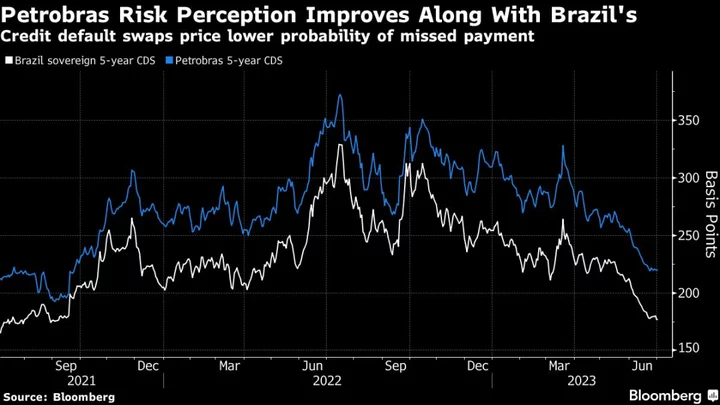Buoyed by the response to its first bond issue in two years, Petroleo Brasileiro SA is considering issuing more debt this year and is poised to buy assets after spending most of the past decade selling refineries and oil-exploration blocks.
Strong cash generation combined with low production costs puts Brazil’s state-run oil giant in a comfortable position, Chief Financial Officer Sergio Caetano Leite said in an interview, adding it’s time for the company to “take a bigger step.”
“Petrobras had a divestment program,” he said. “The company has now changed sides of the table.”
The new appetite for M&A doesn’t mean the company will go on an issuance spree to finance acquisitions or boost investments, according to Leite. Follow-up bond issuances will serve to improve the company’s debt profile, he said.
Petrobras’ gross debt dropped to the lowest level since 2010 in the first quarter to $53.3 billion. That’s close to the low end of a range between $50 billion and $65 billion set in its five-year strategic plan, which the new CFO said he sees as appropriate.
“The idea is not to put Petrobras into debt,” he said to assuage concerns about margins and the speed of investment in energy transition projects. Investments or mergers and acquisitions should have their own financing structure, according to Leite.
Leite took over in March as part of the new executive board appointed by Chief Executive Officer Jean Paul Prates who vowed to halt “irrational” asset sales and said Petrobras should consider raising it stake at petrochemicals Braskem.
“If we need to be aggressive we should owe a little more — $55 billion would be fine,” said Leite, stressing the global turmoiled economic and geopolitical scenario requires prudence.
While Petrobras’ debt ratios may bottom up a bit, the company is still seeking to reduce its cost of capital, in part by canceling its more expensive debt early, Leite said ahead of visiting foreign investors, including in London, this week. The firm’s weighted cost of debt rose to 6.5% at the end of the first quarter compared to 5.9% in 2020, according to regulatory filings.
Last week, the company sold its first dollar-denominated benchmark-size bond deal in two years, and demand suggested additional transactions could be viable, Leite said.
Petrobras’ debt arrangers collected as much as $6.3 billion of potential orders out of 386 investors when a 10-year bond was preliminary discussed at a yield of about 7.25%, according to the CFO. That allowed Petrobras to reduce the offered interest and place $1.25 billion of notes due 2033 on June 26 at a yield of 6.625% with over 327 investors.
“The time had come to put our feet in the water and see what the temperature was,” he said. “The acceptance was good, which leads us to continue looking at the debt markets. Petrobras is back to the game.”
While the yield on the firm’s latest bond is above its weighted average rate, there are several US-dollar transactions that were first priced at more expensive terms, according to data compiled by Bloomberg. For instance, the firm has over $710 million of 7.375% bonds due in 2027, which was first priced at par. The securities are quoted at about 104 cents on the dollar.
“With this resource we’ll improve the profile, paying debts that have a higher rate” said Leite, without disclosing the specific securities that could be included in a transaction which may happen later this year.
The CFO expects investors to be more optimistic about Brazil in the short-term. Talks with bankers suggest the accounting scandal that toppled Brazilian retailer Americanas SA was restricted to the segment, Leite said. “They thought it would be a gunpowder fuse, but it was just a match.”

